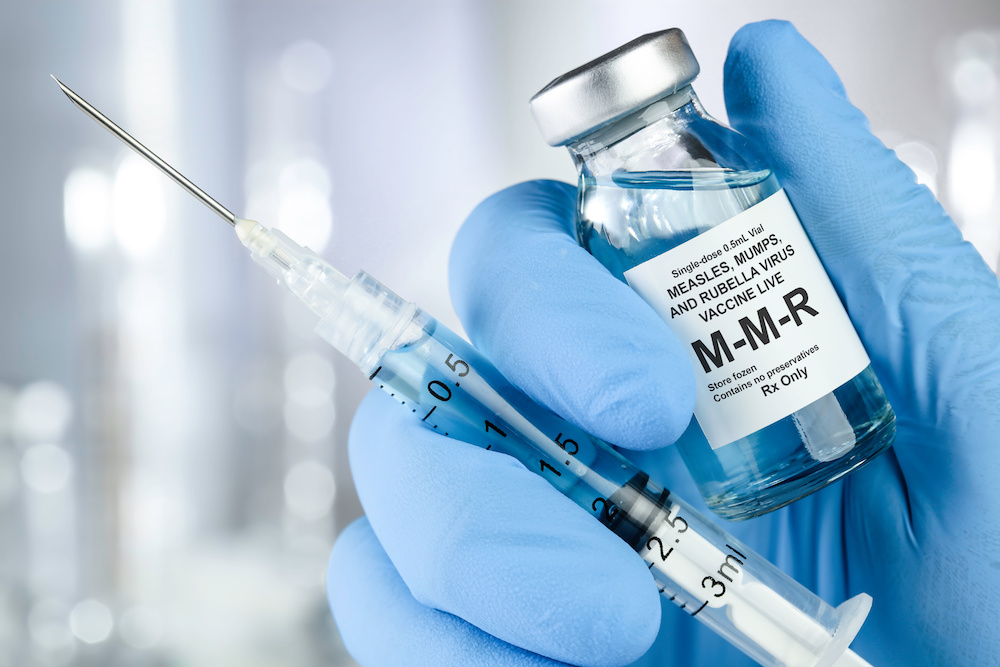Who Needs a Measles Booster? Allegheny County Health Officials Are Fielding Calls
As reports of measles cases rise in parts of the U.S., Pittsburghers are wondering if they're protected from this most contagious disease.
Are you protected from measles? The Allegheny County Health Department has been getting an influx of calls from Pittsburghers trying to find out if they should get a booster shot or blood test as reports of measles cases flare up in pockets around the country.
Two cases were reported recently on the eastern side of Pennsylvania, but a large outbreak in West Texas and New Mexico has now reached nearly 300 cases and has contributed to at least two deaths. Although measles – the most contagious infectious disease on the planet – was declared eliminated from the U.S. by 2000, vaccination rates in some areas have dropped, raising risk of infection. The virus can cause severe disease, even death, especially in children.
A booster involves getting the collective measles, mumps and rubella or MMR vaccine. If you contracted measles — which would have been likely if you were born before 1957 — you are protected for life.
The gray area involves the first measles vaccine that came on the market in 1963 and was used through 1967. It was an inactivated version of the vaccine and wasn’t very effective.
According to Dr. Kristen Mertz, medical epidemiologist for clinical services with the Allegheny County Health Department, here are some guidelines:
If you were:
- Born before 1957: you are considered immune so you don’t need a vaccine (almost everyone in this age group had measles).
- Born between 1957 and 1963: No MMR vaccine was available. You most likely either had measles or were vaccinated at a later date.
- Born between 1963 and 1989: Vaccines were available, and you most likely got one dose. You don’t need another dose unless you got the inactivated vaccine given to some people in 1963-1967 OR you are at high risk. Persons at high risk of exposure need two shots (health care workers, college students, international travelers).
- Born After 1989: You most likely received two doses and are protected.
According to the Centers for Disease Control and Prevention, the version of the measles vaccine used in this country since 1968 contains a weakened form of the live virus; it’s known as the live attenuated vaccine, which is more effective than the first vaccine introduced in 1963.
In 1989, U.S. health agencies started recommending that children get two doses, given a few years apart — the first at around age 1 and the second when youngsters are between 4 to 6 years old. That gives a person 97% protection.
Health professionals say there is no harm in getting a measles vaccine if you had only one shot or are unsure of your status or immunity.
One way to check immunity is with a measles titer blood test, which measures the level of antibodies against measles in a person’s blood. These are available for $15 at the county health department’s immunization clinic Downtown in the Hartley-Rose Building, 425 First Ave., Pittsburgh PA 15219.
The clinic also offers MMR vaccines. MMR is usually covered by insurance since it is a routine vaccine, says Ronnie Das, the department’s public health information officer. If a resident doesn’t have insurance, the county provides the vaccine for free. Local pharmacies and some doctors’ offices also offer the MMR vaccine.
The county health clinic strongly encourages an appointment. Call 412-578-8062. You can also sign up for MyChart to schedule an appointment online. Appointments are preferred and are given priority. Walk-ins are accepted. Parents should bring an ID and a copy of their child’s vaccination records.
Adults at high risk for exposure or severe disease should have documentation of two vaccines or a positive titer, Mertz says. These groups include the following: health care workers, international travelers, college students, people with HIV not severely immunocompromised and those who have close contacts with immunocompromised people.












